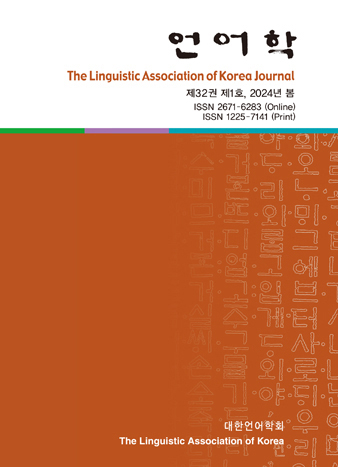대한언어학회 전자저널

32권 1호 (2024년 3월)
- 동료 피드백이 한국 대학생의 영어 발표 능력에 미치는 영향
-
한미향
Pages : 73-92
Abstract
Han, Mihyang. (2024). The effect of peer feedback on Korean college students English presentation skills. The Linguistic Association of Korea Journal, 32(1), 73-92. This study aims to examine the effects of EFL learners peer feedback on their English presentation ability and their awareness of the feedback activities. Twenty four Korean college students participated in three minute English speeches and peer feedback and self feedback activities. The results show that there was no statistically significant difference in scores of three rounds of peer feedback on the students English presentations while there was statistically significant difference in scores of five rounds of self feedback on their own presentations. It suggests that peer feedback on English presentations was made with more care than self feedback and that English speaking and presentation skills need more practice and time to be improved. But the results of the presentation activity survey reveal that the presenters found their performances getting better and their self confidence in English speaking enhanced as they experienced more presentations. The usefulness of English presentation in the classroom is discussed.
Keywords
# 영어 발표(English presentation) # 발표 능력(speaking ability) # 동료 피드백(peer feedback) # 자기 피드백(self feedback) # 채점표(rubric)
References
- 김상경. (2015). 휴대전화로 제작한 동영상이 이공계 학생의 영어발표수업에 미치는 학습효과. 멀티미디어언어교육, 18(3), 142-165.
- 박강희. (2012). 발표 교육 실험이 영어 학습에 미치는 영향. 국제언어문학, 26, 187-210.
- 원명옥. (2015). EFL 환경에서 구어발표를 통한 영어 발화의 유창성 향상 방안. 언어과학연구, 75, 205-230.
- 이경하, 김은주. (2005). 한국 대학생 EAP 영어 학습자의 영어 구두 발표 전략 훈련의 효과에 대한 연구. 외국어교육, 12(4), 401-435.
- 이희경, 김진희. (2009). 영어 말하기 능력의 다집단 교실 평가 가능성에 대한 연구-자기, 동료, 교사 평가 중심으로– 영어교욱연구, 21(4), 241-264.
- 주경숙. (2003). 중학교 2학년 영어 말하기 수행평가에서 평가 방법에 따른 역류효과의 비교연구: 교사 평가, 자기 평가, 동료 평가를 중심으로. 이화여자대학교 대학원. 석사학위논문.
- Blue, G. (1994). Self-assessment of foreign language skills: Does it work? CLE Working Paper, 3, 18-35.
- Brooks, G., & Willson, J. (2015). Using oral presentations to improve students’ English language skills. Kwansei Gakuin University Humanities Review, 18, 199-212.
- Brown, H. D. (2007). Principles of learning and teaching. White Plains: Pearson Education.
- Chen, Y. (2006). Peer and self-assessment for English oral performance: A study of reliability and learning benefits. English Teaching and Learning, 30(4), 1-22.
- De Grez, L., Valcke, M., & Roozen, I. (2012). How effective are self- and peer-assessment of oral presentation skills compared with teachers’ assessments? Active Learning in Higher Education, 13, 120-142.
- Gershon, S. (2015). Present yourself 2: Viewpoints (2nd ed.). Cambridge: Cambridge University Press.
- Girard, T., Pinar, M., & Trapp, P. (2011). An exploratory study of class presentations and peer evaluations: Do students perceive the benefits? Academy of Educational Leadership Journal, 15(1), 77-93.
- Goh, C., & Burns, A. (2012). Teaching speaking: A holistic approach. Cambridge: Cambridge University Press.
- Jahromi, D. (2020). Can teacher and peer formative feedback enhance L2 university students’ oral presentation skill? In S. Hidri (Ed.), Changing language assessment (pp. 95-131). Switzerland: Palgrave Macmillan.
- Lee, Y. (2017). Sharing peer feedback: How does it affect EFL learners’ oral presentation skills? Asia-pacific Journal of Multimedia Services Convergent with Art, Humanities, and Sociology, 7(12), 307-322.
- Lv, X. (2013). Peer assessment of perception and attitudes in public speaking English classes. World Transactions on Engineering and Technology Education, 11(4), 445-449.
- Miles, R. (2009). Oral presentations for English proficiency purpose. Reflections on English Language Teaching, 8(2), 103-110.
- Mika, S. (2006). Peer- and instructor assessment of oral presentations in Japanese university EFL classrooms: A pilot study. Waseda Global Forum, 3, 99-107.
- Patri, M. (2002). The influence of peer feedback on self- and peer-assessment of oral skills. Language Testing, 19(2), 109-131.
- Topping, K. (2009). Peer assessment. Theory and Practice, 48, 20-27.
- White, E. (2009). Student perspectives of peer assessment for learning in a public speaking course. Asian EFL Journal– Professional Teaching Articles, 33(1), 1-36.